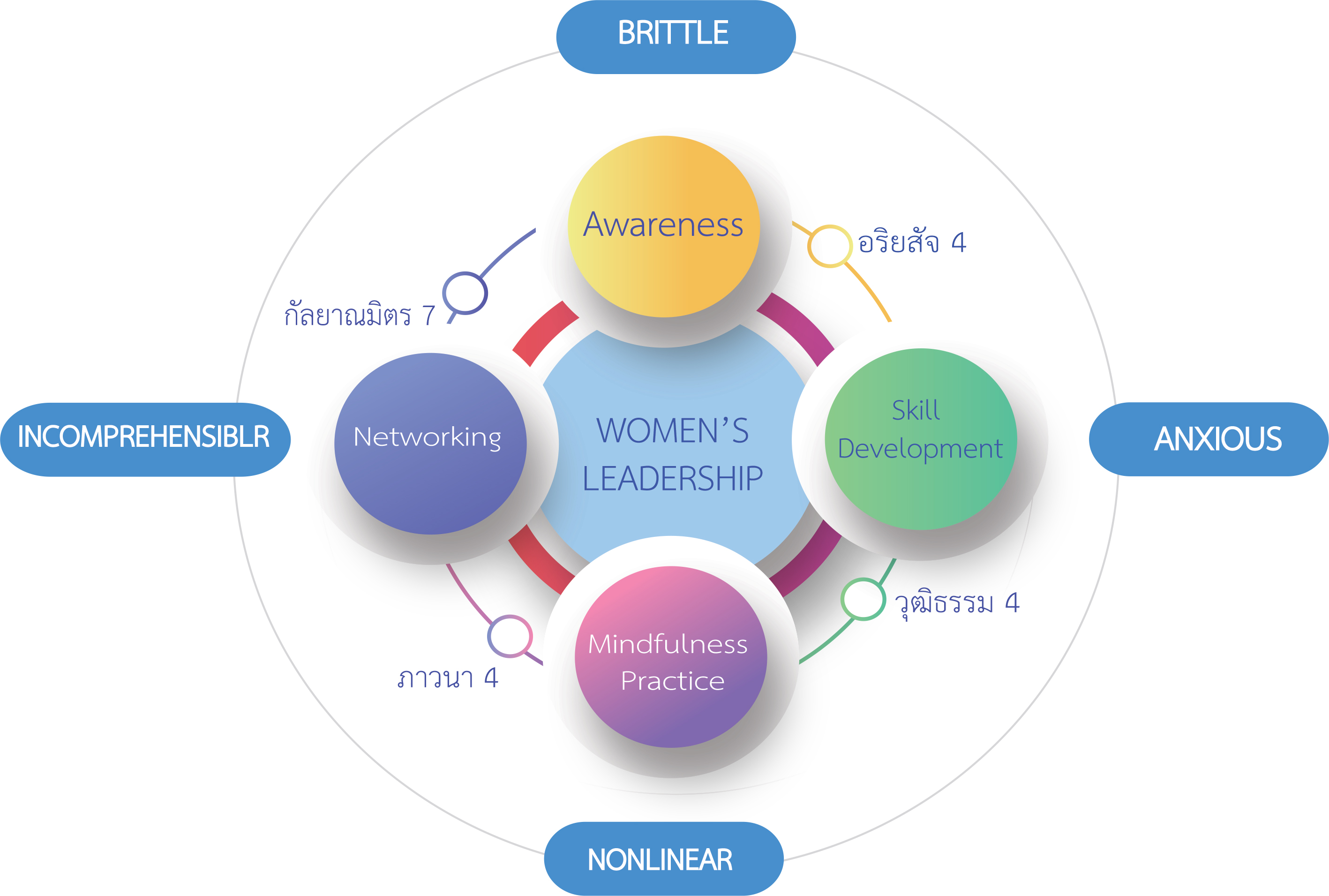The World Dynamics of the Bani Era and Women’s Leadership Roles in the Context of Educational Institutions: Reflections on the Integration of Strategies Based on the Buddhist Way
Keywords:
BANI Era, Role, Female Leadership, Buddhist PrinciplesAbstract
The current era, marked by global turmoil, presents an unpredictable wave of change, significantly impacting the way we live and manage organizations. This article focuses on the development of female leadership in educational institutions, particularly in the BANI era, which is characterized by fragility, anxiety, non-linearity, and incomprehensibility. Education and learning management face challenges arising from uncertainty and rapid changes. Research indicates that strategies for developing female leadership must be appropriate and effective. Integrating Buddhist principles as a foundation for development will help enhance the ethics and morality of female leaders. The application and integration of four Buddhist principles-The Four Noble Truths, The Four Virtues, The Seven Noble Friends, and The Four Meditations-can be applied effectively within educational institutions. This study in the spiritual and ethical dimension will provide guidelines for developing female leaders with ethics and social values that adapt to ever-changing times. Suggestions for implementation include empowering stakeholders to enhance their knowledge and skills in applying Buddhist principles for developing female leadership, creating networks of noble friends within educational institutions to share experiences and support one another, and using meditation techniques to enhance mindfulness and ethical decision-making, which will contribute to the development of leadership that adds value to the advancement of educational quality. This study will be beneficial to school administrators, educators, and stakeholders involved in developing female leadership, aiming to create an equitable and sustainable society.
References
กัญชพร ปานเพ็ชร. (2565). ภาวะผู้นำเชิงจริยธรรมตามหลักวุฒิธรรมสำหรับผู้บริหารสถานศึกษาในยุค 4.0. วารสารครุศาสตร์ปริทรรศน์, 9(1), 491-498.
กุลชลี จงเจริญ. (2562). การพัฒนาชุดฝึกอบรมผ่านเว็บเพื่อเสริมสร้างความเข้มแข็งด้านศักยภาพภาวะผู้นำของผู้บริหารสถานศึกษาสตรีในประเทศไทย. วารสารครุศาสตร์ จุฬาลงกรณ์มหาวิทยาลัย, 47(1), 18-36.
ธีรวัฒน์ บงแก้ว. (2565). แนวทางการส่งเสริมการบริหารงานวิชาการตามหลักภาวนา 4 ของผู้บริหารโรงเรียนสังกัดสำนักงานเขตพื้นที่การศึกษาประถมศึกษาเลย เขต 2. วารสารบัณฑิตสาเกตปริทรรศน์, 7(2), 140-150.
ธีระ รุญเจริญ. (2553). ความเป็นมืออาชีพในการจัดและบริหารการศึกษา. กรุงเทพฯ: ข้าวฟ่าง.
นรชัย ณ วิเชียร และคณะ. (2562). อริยสัจ 4 กับการพัฒนางองค์กร. วารสารมนุษยศาสตร์และสังคมศาสตร์ มหาวิทยาลัยธนบุรี, 13(1), 165-174.
นวลนภา จุลสิทธิ และคณะ. (2567). ภาวะผู้นำเชิงนวัตกรรมกับการบริหารการเปลี่ยนแปลงองค์กรภาครัฐภายใต้ยุค VUCA. วารสารสหวิทยาการมนุษยศาสตร์และสังคมศาสตร์, 7(1), 310-328.
ประเวศ วะสี. (2564). พุทธวิธีสร้างสุขสร้างสุขภาวะสำหรับคนทั้งมวล. เข้าถึงได้จาก https://www.isranews.org/article/isranews-article/103131-isra-52.html
พระพรหมบัณฑิต (ประยูร ธมฺมจิตฺโต). (2565). พระพุทธศาสนากับสถาบันพระมหากษัตริย์. กรุงเทพฯ: สำนักงานพระพุทธศาสนาแห่งชาติ.
พีระ อุดมกิจสกุล. (2565). การประยุกต์หลักภาวนา 4 เพื่อการบริหารทรัพยากรมนุษย์ ของบริษัทไปรษณีย์ไทย ดิสทริบิวชั่น จำกัด. วารสารสหวิทยาการนวัตกรรมปริทรรศน์, 5(2), 58-66.
มติชนออนไลน์. (2567). TMA 60 ปี ดึงผู้นำองค์กรชั้นนำร่วมแลกเปลี่ยนวิสัยทัศน์สู่อนาคตยั่งยืน ซีพี ชี้ ธุรกิจต้องปรับตัวเพื่อความยั่งยืน. เข้าถึงได้จาก https://www.matichon.co.th/publicize/news_4800722
มัชฌิมา วงษ์จันทร์เพ็ง. (2564). คุณลักษณะผู้นำของผู้บริหารสตรีในสถานศึกษาขั้นพื้นฐานในยุคดิจิทัล. วารสารบริหารการศึกษาบัวบัณฑิต, 21(2), 41-50.
รตสิรี นาทอง และคณะ. (2559). ศึกษาวิเคราะห์บทบาทองค์กรสตรีด้านการแก้ปัญหาสตรีในสังคมไทยปัจจุบันด้วยหลักพุทธธรรม. วารสารวิชาการธรรมทรรศน์, 16(2), 133-147.
ริญญารัตน์ วรจินตนาลักษณ์ และคณะ. (2563). การศึกษาสุขภาวะยุคไทยแลนด์ 4.0 ตามหลักภาวนา 4 ของนิสิตมหาจุฬาลงกรณราชวิทยาลัย. วารสารวิจัยการบริหารการพัฒนา, 10(4), 39-53.
สมเด็จพระพุทธโฆษจารย์ (ป. อ. ปยุตฺโต). (2562). พุทธธรรม. (พิมพ์ครั้งที่ 53). กรุงเทพฯ: ทบทัน.
สรกล อดุลยานนท์. (2567). คำถามของ “ผู้นำ”. เข้าถึงได้จาก https://www.prachachat.net/opinion-column-2/news-1657607
อนิรุทธิ์ ตุลสุข. (2565). จาก VUCA world สู่ BANI WORLD. เข้าถึงได้จาก https://www.coachforgoal.com/
อภิชญา พรรณศรี และคณะ. (2567). บทบาทสตรี: ภาวะผู้นำร่วมสมัย. วารสารเสฏฐวิทยปริทัศน์, 4(1), 1-12.
อาชวัน อัศวนิก และปาณิสรา เบี้ยมุกดา. (2563). แนวทางแก้ปัญหาในองค์กร SME ในสังคมไทยตามแนวอริยสัจ 4. วารสาร มจร พุทธศาสตร์ปริทรรศน์, 4(2), 106-123.
Davies, M. & Bui sine, S. (2018). Innovation Culture in Organizations. Science, Technology and Innovation Culture, 3, 6-11.
Edmunds, M. (2007). The female superintendency: Reframing our standing of women’s leadership styles and behaviors. Dissertation in Doctor of Education, Seton Hall University.
Jamais Cascio. (2022). A framework for understanding a turbulent world. Retrieved from https://ageofBANI.com/.
Kotter J. P. (1995). Leading change: Why transformation efforts fail. Harvard Business.
Wickham, M. D. (2007). Female superintendents: Perceived barriers and successful. strategies used to attain the per intendency in Los Angelis. Dissertation in Doctor of Education University of the Pacific.






